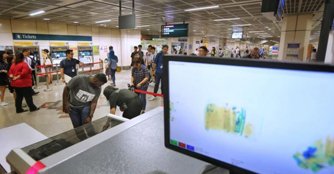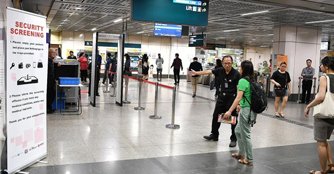Enhanced security checks start at two MRT stations
13 Nov 2018|1,989 views
Despite concerns about inconvenience, a six-month trial of increased security checks at selected MRT stations here began without a hitch on Monday (12 November).
About 20 people were screened between 10:00am and 10:30am at the entrance of the Little India station on the North-East Line, where four Aetos security officers were stationed together with equipment such as metal detectors and X-ray scanners.
The commuters were required to use a walk-through metal detector and pass their belongings through X-ray scanners before entering the fare gates. Most checks were completed in under half a minute.
The Land Transport Authority (LTA) said that like the bag checks currently conducted at MRT stations here, not all commuters will require enhanced security screenings. "As these checks are random, it will not cause delay to the majority of commuters," said the authority's Public Transport Security Deputy Director Joseph Goh. He said the security officers are trained to identify potential threats, such as bulky bags. Data collected from the trial - such as how long it takes to screen commuters - will be used to improve the screening process. The trial is part of the LTA's efforts to review and enhance security on the Republic's rail network, said. Mr Goh.
Public transport systems are particularly vulnerable to terror attacks due to the large numbers of people passing through every day, he said, noting that attacks have taken place on other subway networks. In one of the more recent incidents, a suicide bomber in 2017 exploded a device on the Saint Petersburg metro in Russia that left 15 people dead and 45 injured.
During the trial in Singapore, checks were conducted at the Little India station at its North-East and Downtown Line entrances, as well as at the Bedok station on the East-West Line. At Bedok, The Straits Times observed only one commuter having to go through the additional security screenings between 11:30am and noon. While security equipment was placed at three other stations - Ang Mo Kio and Yishun on the North-South Line, as well as Bukit Panjang on the Downtown Line - these were not in use on Monday. Their visible presence is to get commuters used to the idea of enhanced security.

The Straits Times approached two commuters at Little India station who went through the enhanced security checks on Monday. Ms. Ang Sui Tjie, who was at the station at 10:30am, worries that the checks could be disruptive during peak hours.
The 46-year old, who is currently unemployed, said, "If I have to go through this every time I take the MRT, it would be very inconvenient, especially when I'm rushing."
During peak hours, trains arrive at the station every two minutes. Mr. Subramaniam Balasubramaniam felt it was not inconvenient and said he understood the need for such checks. "Having to go through such random checks, I feel safer," said the 45-year old manager.
Despite concerns about inconvenience, a six-month trial of increased security checks at selected MRT stations here began without a hitch on Monday (12 November).
About 20 people were screened between 10:00am and 10:30am at the entrance of the Little India station on the North-East Line, where four Aetos security officers were stationed together with equipment such as metal detectors and X-ray scanners.
The commuters were required to use a walk-through metal detector and pass their belongings through X-ray scanners before entering the fare gates. Most checks were completed in under half a minute.
The Land Transport Authority (LTA) said that like the bag checks currently conducted at MRT stations here, not all commuters will require enhanced security screenings. "As these checks are random, it will not cause delay to the majority of commuters," said the authority's Public Transport Security Deputy Director Joseph Goh. He said the security officers are trained to identify potential threats, such as bulky bags. Data collected from the trial - such as how long it takes to screen commuters - will be used to improve the screening process. The trial is part of the LTA's efforts to review and enhance security on the Republic's rail network, said. Mr Goh.
Public transport systems are particularly vulnerable to terror attacks due to the large numbers of people passing through every day, he said, noting that attacks have taken place on other subway networks. In one of the more recent incidents, a suicide bomber in 2017 exploded a device on the Saint Petersburg metro in Russia that left 15 people dead and 45 injured.
During the trial in Singapore, checks were conducted at the Little India station at its North-East and Downtown Line entrances, as well as at the Bedok station on the East-West Line. At Bedok, The Straits Times observed only one commuter having to go through the additional security screenings between 11:30am and noon. While security equipment was placed at three other stations - Ang Mo Kio and Yishun on the North-South Line, as well as Bukit Panjang on the Downtown Line - these were not in use on Monday. Their visible presence is to get commuters used to the idea of enhanced security.

The Straits Times approached two commuters at Little India station who went through the enhanced security checks on Monday. Ms. Ang Sui Tjie, who was at the station at 10:30am, worries that the checks could be disruptive during peak hours.
The 46-year old, who is currently unemployed, said, "If I have to go through this every time I take the MRT, it would be very inconvenient, especially when I'm rushing."
During peak hours, trains arrive at the station every two minutes. Mr. Subramaniam Balasubramaniam felt it was not inconvenient and said he understood the need for such checks. "Having to go through such random checks, I feel safer," said the 45-year old manager.
Latest COE Prices
January 2026 | 1st BIDDING
NEXT TENDER: 21 Jan 2026
CAT A$102,009
CAT B$119,100
CAT C$75,503
CAT E$122,000
View Full Results Thank You For Your Subscription.




















